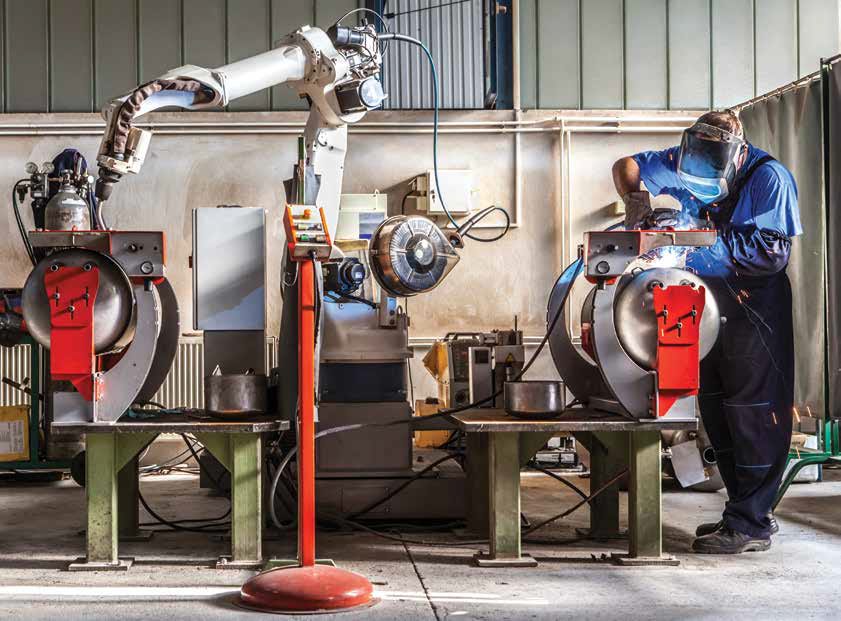I’ve made a bet with my dad’s friend Keith about the future of work. If, after 10 years, coffee shops are staffed by robots, I owe him a cup of coffee (to be served by a robot). If coffee shops are still run by plain ol’ humans, he owes me a cup.
Whose side of the bet would you take, dear reader? Will I burn with shame as I buy his coffee from my new robot overlord? Or will a kindly smiling barista hand us our coffee and wish us a good day as Keith forks over 10 bucks?
The thing is, we made the bet five years ago, which means there are only five years left on the clock.
Here are the arguments. Keith says “In the not so distant future, everything that we regularly use and much of what we do will be made and done by machines. My axiom is: if a machine can make (or do) it, a machine will make (or do) it.”
I say the opposite: machines may not do all the work that they are capable of. Why? For the same reason that a particular human doesn’t do all the work that he or she is capable of: if might not be the best use of your time and talent. Just because a machine can do the work, it doesn’t mean that it will.

We’ve had automatic coffee machines for years. But here humans are, still serving coffee. Why? The barrier to robot baristas isn’t the level of technology. It’s that robot technology is best used for other tasks.
In economics this is called “comparative advantage.” It means that we don’t necessarily do the work that we’re best at. We do the work that others don’t have time to do, the same way that a lawyer hires a paralegal or a parent hires a babysitter. The lawyer could make legal briefs better than the paralegal and the parent would do a better job watching the child. But in both cases they have things they need to do, so they hire help.
In the coffee shop scenario, the human baristas are the paralegals or the babysitters. (Though I’m sure baristas will insist that robots can’t pull espresso shots as well as humans can.)1
Of course, the hot topic isn’t robots. It’s artificial intelligence (A.I.). A.I. is sweeping the planet with its breathtaking powers. It looks like it and its robot accomplices will be able to do absolutely any job. And I’m sure they can.
You see, I’m going out on a limb a bit by arguing that a particular job won’t be taken by machines. Because many jobs have been taken by machines in the past. My logic only holds that all human jobs won’t be taken by machines. There’s a real chance that in four years, there’s a sudden surge of robot baristas, and I lose the bet. Technology can’t take all human jobs – there will be jobs as long as there are problems to solve – but it certainly can change what jobs people do.
We have seen the growth of A.I. jobs close to home, in fact, in the very home of the Day family. My eldest daughter, Daisy, decided to write a young adult novel. It’s handwritten. When she started writing, she asked if we could transcribe it to the computer so she could print it. I explained to her that transcription is tedious and time-consuming; transcribing a whole novel might not be possible.
But then I tried using A.I. I took a picture of her first page, uploaded the picture to Google Gemini, and told it to “transcribe this page of a handwritten novel. Copyedit it and format the spacing.”
Presto! It came out perfectly. I copy and pasted it into a Google Docs and the book was on its way. Daisy was exhilarated and decided to write even more. She used A.I. image generation to create a cover. We got it printed through a website.
Calvin, the next oldest, saw how do-able this all was and decided to write his own short novel.
Check out this sweet book!
What’s the point here, and what does it have to do with robot coffee?
In the example of the books we see jobs been destroyed and jobs being created. By doing our editing with A.I., we were destroying their grandmother’s job. My mom was a long-time editor. She helped graduate students smooth out their academic writing.
Poof! With the advent of A.I. Large Language Models, her job disappeared into thin air. Don’t worry, she retired a couple years ago. She's not looking for work.
But here’s the crucial part: the A.I. got my kids to write more. It created jobs. Without the A.I. tech, their books would have been too laborious to transcribe and they wouldn’t have such nice covers. They wouldn’t have gone to the trouble of writing the whole book. But because the tech enabled them to make a glorious, professional-looking book, it induced them to write more. The payoff was worth it.
Think of it: an A.I. tool that writes caused the kids to write more. Handwriting, too! This shows just how difficult it is to predict the effect that technology will have on jobs. Even tech that should crowd out a job can sometimes crowd it in.
Similarly, technology that helps keep a coffee shop open could provide more jobs for baristas. The robots will do all kinds of work that makes the coffee shop experience cheaper to provide. But there will always be a place for the humans. I’d bet a $5 cup of coffee on it.2
If you haven’t pre-ordered your copy of Teach a Kid to Save yet, now is the time to do so. A.I. had no effect of any kind on this book!
My economics lesson here is necessarily truncated. For a good summary of where the debate about A.I. stands in the econ profession, see this small but powerful post by Tyler Cowen.
Keith has since come to believe that the hospitality industry will retain human work. so it can keep that human touch.





Nice piece!
Love this. I especially love listening to you read it. Might have to incorporate in my own substack. Thanks for the inspiration. Also, I enjoyed your explanation of comparative advantage. I hadn’t heard it that way before